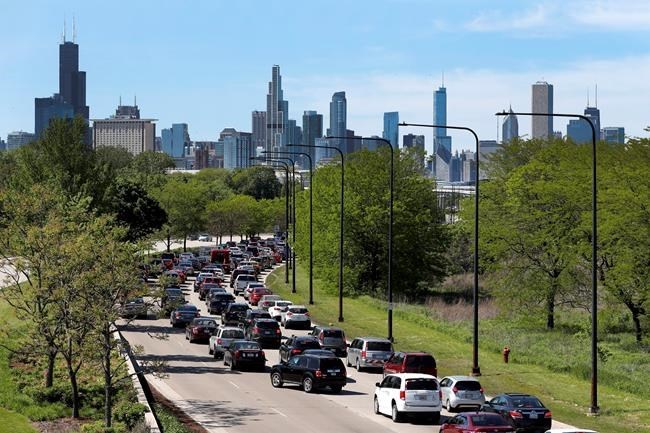
Motorists traveling northbound on Lake Shore Drive to downtown Chicago sit in stalled traffic Sunday, May 31, 2020, as police forced traffic off at the 31st Street exit, as part of a security perimeter around the downtown area. (AP Photo/Charles Rex Arbogast)
Republished May 31, 2020 - 8:21 PM
Original Publication Date May 31, 2020 - 7:46 PM
CHICAGO - While Chicago officials took extraordinary steps Sunday to patrol and restrict access to downtown in the hopes of preventing further chaos after tense weekend protests over the death of George Floyd, destruction and unrest spread to the city's neighbourhoods and suburbs.
Vandals smashed windows at a shoe store in the heavily-Mexican Little Village neighbourhood. Crowds broke into a Family Dollar store at a South Side strip mall. Multiple suburban shopping malls were closed, including in Calumet City, where the mayor declared a “state of emergency."
The unrest fanned out after a weekend of chaos in Chicago, as peaceful protests devolved into clashes with police, fires and property damage. By midday Sunday, six people had been shot, one fatally, 240 people were arrested and about 20 police officers injured in connection with the demonstrations, Chicago police said.
Mayor Lori Lightfoot, who ordered an indefinite nightly 9 p.m. curfew, said the Illinois National Guard had been requested to help keep order. She said access to the central business district would be restricted to only essential workers and people who live there. Public transportation was temporarily suspended, major streets blocked with sanitation trucks and Chicago River drawbridges allowing traffic into downtown remained lifted.
“Seeing the murder of George Floyd sickened me and it still does,” Lightfoot said at a news conference, taking several breaks to compose herself. “But rather than respond to his death as we should and focus our energy toward doing the hard work to create the change that we need, we have instead been forced to turn our focus and energy toward preventing wanton violence and destruction”
Police Superintendent David Brown said officers were working 12-hour shifts to respond. When asked by reporters about what appeared to be a lack of police intervention as some businesses were destroyed, he said the public shouldn't “switch the blame to the cops” and commended officers' professionalism.
Floyd, a handcuffed black man, died last Monday as a white Minneapolis police officer pressed his knee into Floyd's neck. That officer, Derek Chauvin, and the three others w ere fired. Chauvin faces third-degree murder and manslaughter.
Protests and unrest — sparked by Floyd's death and the broader issue of the treatment of black people by police — unfolded in cities nationwide. Smaller, mostly peaceful protests, continued Sunday around Chicago, including outside Lightfoot’s house and police headquarters.
Gov. J.B. Pritzker activated 375 Illinois National Guard soldiers to assist with street closures. By evening, the Chicago Transit Authority had suspended all bus and rail lines “at the request of public safety officials" with service resuming Monday. Metra, a commuter rail agency, suspended service Monday in part for “the safety of the public and our employees.”
The communities of Tinley Park, Crestwood and Oak Lawn were among those alerting residents to stay home due to civil unrest. Police reported a “large disturbance” at a North Riverside mall, including a shooting that left one person hospitalized. Calumet City officials said hundreds vandalized a mall, prompting an 8 p.m. curfew and the closure of highway exit ramps into the south suburb.
“Obviously, Calumet City is in a state of emergency,” Mayor Michelle Markiewicz Qualkinbush told The Chicago Tribune. “We are shutting down the city to get a handle on this.”
Aurora, Illinois' second-largest city, issued an 8:30 pm curfew due to “widespread incidents of violence, vandalism and stealing," Mayor Richard Irvin said in a statement declaring a state of emergency.
Chicago city officials suggested some of the vandalism stretching into Sunday was a co-ordinated effort, which remained under investigation. During downtown protests, police used batons to beat back demonstrators. Police cars were set ablaze. Windows were smashed at neighbourhood convenience stores and high-end Michigan Avenue shops alike.
Still, some criticized Lightfoot's restrictions. The American Civil Liberties of Union of Illinois said it was considering legal action over an indefinite curfew that raised “serious constitutional questions that need to be remedied."
Lightfoot, a former federal prosecutor, defended her response as necessary.
Volunteers swept up glass and cleaned debris Sunday. Among them was Michelle Eleby, who worked outside a downtown Macy's where display windows had been smashed.
The 42-year-old said Floyd's death was “enraging” particularly as she lives in fear of racial profiling for herself and family. Her father is black and her mother is white.
“I needed to do something,” she said of her motivations to help. “We can’t sit back and hope the solution is going to come.”
___
Follow Sophia Tareen on Twitter: https://twitter.com/sophiatareen
News from © The Associated Press, 2020